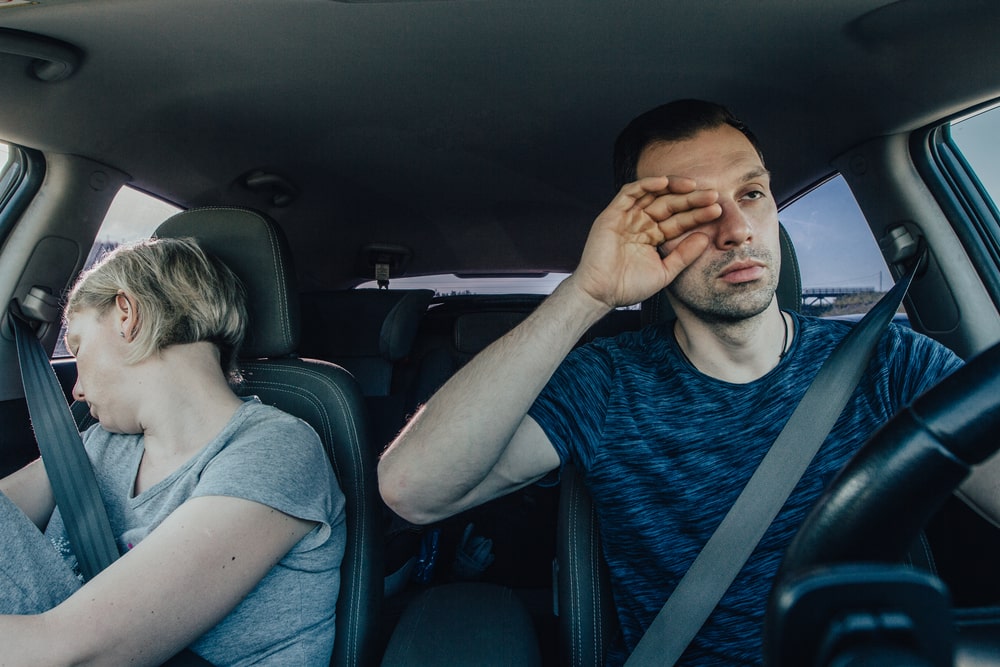At some point or another, most drivers operate a vehicle while tired. While driving while tired might not seem like a problem, it can be if the fatigue starts to impair a driver’s ability to drive safely.
Operating a vehicle while fatigued can easily result in a car accident and serious injuries. If you’re in a collision with a fatigued driver, speak with an accident attorney. A car accident lawyer can help prove the cause of your accident and pursue fair financial recovery on your behalf.
What is Driver Fatigue?

Driver fatigue refers to feelings of sleepiness or drowsiness that drivers often experience for one reason or another. Driving while fatigued not only puts drivers themselves at risk, but also others on the road. As many as one in five car accidents involving fatalities involve driver fatigue.
Causes of Fatigue
Drivers can experience fatigue for many reasons. While lack of adequate sleep is top of the list, other factors can result in drivers feeling particularly tired, impacting their ability to drive.
Lack of Sleep
Most adults require at least seven to nine hours of sleep a night. When car drivers don’t get enough sleep, they can experience excessive fatigue, making them feel too tired to function. Yet many individuals still get behind the wheel, often due to necessity, like traveling to and from work.
Medical Conditions
Certain medical conditions can cause fatigue, including sleep apnea and restless legs syndrome. Narcolepsy is one of the most well-known conditions that can cause issues for drivers.
It is a neurological condition where the brain cannot properly regulate the sleep/wake cycle. Individuals suffering from narcolepsy are more likely to fall asleep at inopportune times, like while driving.
Additionally, when a person is sick, for example, with the flu, they may experience more tiredness than usual, so driving is not a good idea.
Medications
Many medications come with less-than-ideal side effects, fatigue being one of them. When a driver takes certain medications, including antidepressants, antihistamines, and antiemetics, it can cause feelings of sleepiness.
This is why medications come with warning labels to prevent drivers from performing certain tasks while on the medication, like driving.
Time of Day
The time of day can have a lot to do with a person’s feelings of sleepiness. Drivers are more prone to experiencing fatigue at night, especially when driving for long hours after the sun sets. The darkness and monotony of driving combined can be a recipe for disaster.
Long Work Hours
Physical labor and long work hours can make a person feel very tired. This tends to be a significant issue for individuals who drive for a living, like delivery drivers and semi-truck drivers.
Those Most At Risk of Fatigued Driving
While anyone can experience fatigue, some individuals are more at risk, including:
- Long-haul drivers
- Individuals who work the night shift
- Business travelers who drive long distances or experience jet lag
- Employees who work 60 or more hours a week
- Individuals with certain medical conditions
- Young individuals 26 or younger
While people who belong to at least one of the above groups can still drive, they must carefully consider whether they can, in fact, drive safely. Getting behind the wheel while experiencing intense fatigue is never a good idea, as it can have negative repercussions.
Physical and Cognitive Effects of Fatigue on Car Drivers
Fatigue can have both physical and cognitive effects on drivers, making it much more challenging to drive safely.
Among the many things fatigue can do to a person’s body and mind, it can:
- Diminish alertness and concentration
- Slow reaction times
- Impact the decision-making progress
- Affect judgment
- Impact physical coordination
- Reduce the ability to control the vehicle
Being tired may not seem like it can have such an effect on driving, but it can. Fatigue affects some drivers more than others, making it nearly impossible to operate a vehicle safely and responsibly and keep others free from danger.
Fatigued Driving is the Equivalent of Drunk Driving
Shockingly enough, the effects of fatigued driving have been closely compared to those of drunk driving. While not identical, both sleepiness and alcohol have negative effects on the brain and body, making it harder for individuals to drive and increasing the likelihood of causing accidents.
Alcohol impairment causes issues with vision, depth perception, and the ability to accurately judge driving speed. Impaired drivers are typically uninhibited and impulsive, which results in risky driving behaviors.
This varies slightly from fatigued driving, which affects a person’s ability to respond to situations properly and remain vigilant. Fatigued drivers are less likely to react fast enough to avoid crashes.
Physically, being tired can have particularly similar effects to being drunk. Studies have shown the likeness between fatigue and drinking.
After 18 hours of no sleep, the impact on the body is comparable to having a blood alcohol content (BAC) of 0.05 percent. After 20 hours of being awake, the body reacts similarly to a BAC of 0.08 percent, the legal limit in most states. After 24 hours with no sleep, impairment is similar to 0.1 percent BAC.
Driving under the influence is illegal in every state. While there are no laws regarding fatigued driving, drivers should take special care to avoid driving if their fatigue is enough to impair their driving ability.
Ignoring the Signs of Fatigue
Fatigued drivers exhibit certain signs that can indicate they’re too tired to be behind the wheel.
Some of the common signs and symptoms of drowsy driving include:
- Frequent yawning
- Trouble keeping your eyes open
- “Zoning out,” causing an inability to remember driving the last few miles
- Having trouble keeping your head up or nodding off
- Difficulty maintaining a steady speed
- Missing signs or turns
- Drifting in and out of your lane
- Hard braking
Any of the above can indicate a driver is too drowsy to drive safely. Still, many drivers ignore these signs and continue to drive, increasing the likelihood of causing car accident.
Risks Associated with Fatigued Driving
There are certain risks of driving while drowsy. When a driver chooses to drive while tired, they’re putting themselves and others at risk.
Falling Asleep at the Wheel
Falling asleep behind the wheel is one of the most significant risks of driving while tired. The dull task of driving can make it much easier for drivers to nod off at the wheel. This is especially an issue at night while driving down dark roads, as the brain naturally reacts to the darkness by making drivers feel sleepy.
Violating the Law
Driving while fatigued increases the possibility of violating road rules. For example, when a driver is tired, they may run red lights or stop signs, follow vehicles too closely, or speed, all of which can result in traffic violations.
Causing Car Accidents
Fatigued driving can easily result in collisions. Drivers are often incapable of retaining strong control over their vehicles and are more likely to engage in dangerous driving behaviors, like weaving in and out of traffic, which can result in collisions with other drivers.
Aside from crashes involving other drivers, fatigued driving puts the driver at risk of a single-car accident, like driving off the road or running into stationary objects.
What to Do After an Accident With a Fatigued Driver
Getting into an accident with a fatigued driver can be upsetting and frustrating, especially because you know the accident was entirely preventable. You can protect your rights, hold the driver responsible, and recover compensation.
First and foremost, seek medical attention. Regardless of whether you receive emergency care, follow up with a qualified physician to better assess your injuries and develop a treatment plan.
Report your accident to your insurer. Even if the accident is not your fault, your insurance company needs to know when you’ve been in an accident. Depending on your state’s fault laws, you may either file a collision claim under your own insurance or a third-party claim with the at-fault driver’s insurer.
Finally, you should not wait to seek legal guidance. In the days following your accident, find an experienced accident attorney in your area and schedule a consultation.
During your initial meeting, the attorney will review the details of your situation and determine whether you have a valid claim. If so, they can begin working on your case right away.
Building a Case Against the At-Fault Driver
Proving liability is one of the cornerstones of your compensation claim. Your accident attorney can build a case against the at-fault driver, which includes establishing their fault.
Driving while fatigued is usually considered negligent. Negligence refers to a failure to act in the same way a reasonable person should have acted in a similar situation. Considering the circumstances, the fatigued driver should not have gotten behind the wheel.
Successfully proving negligence requires you to satisfy the elements of negligence.
This means you must show:
- The driver owed you a legal duty of care
- The driver’s actions caused a breach of their duty of care
- These wrongful actions caused your accident
- You sustained injuries and losses as a result
Making these claims is not enough without evidence proving the driver’s liability. Therefore, your accident lawyer will acquire the evidence necessary to show that the driver’s fatigue ultimately caused your collision and injuries.
Damages for Fatigued Driving Collision Cases
If you suffer injuries and losses in an accident with a fatigued driver, you shouldn’t have to be responsible for the financial burdens that usually come after. Pursuing damages can help take some of the pressure off you and compensate you for your undue losses.
Some of the economic and non-economic damages you may be entitled to receive include:
- Medical bills for the past and future
- Diminished earning capacity
- Lost earnings
- Property damage
- Disability
- Emotional distress
- Pain and suffering
Punitive damages may also be available, depending on the circumstances. These damages only apply in cases where the responsible party acted in a grossly negligent, egregious, or malicious manner.
Unlike compensatory damages, punitive damages punish the defendant for their wrongdoing and deter others from acting similarly in the future.
Several factors influence the value of your case and the damages you can pursue, including the severity of your injuries, the impact on your ability to earn a living, and the effect your accident and injuries have on your mental and emotional health.
You can rely on your accident attorney to calculate your damages and seek a settlement that adequately compensates you for your losses.

How a Car Accident Attorney Can Help with Your Fatigued Driving Case
After a car accident, it’s best to hire a lawyer to handle your claim. Having an attorney on your side can yield much more favorable results.
Your lawyer will handle every case-related task, from collecting evidence and proving liability to communicating with the insurance company and negotiating a fair settlement. When you hire an attorney, you can feel confident knowing you have the best possible ally for your legal battle.
Soon after your collision, consult with a car accident attorney. A consultation with a car accident attorney is a crucial step in understanding your legal options and seeking compensation for your injuries. During this meeting, expect the attorney to listen attentively as you share details about the accident.
They will assess the strength of your case, discuss potential legal strategies, and explain the claims process. The attorney may provide insights into the expected timeline and potential outcomes. Additionally, you’ll have the opportunity to ask questions and address concerns.
This consultation is a valuable opportunity to gain clarity on your situation and make informed decisions about pursuing legal action for medical bill expenses, lost wages, and other damages resulting from the car accident.
Time is limited to take action under the law, as statutes of limitations restrict the time you have to file your claim. Your personal injury attorney in Miami can handle your claim promptly and efficiently, and the fatigued driver is liable for the harm they caused you. Never delay in securing legal representation for your car accident claim.
Related articles
Related articles Related articles Related articles Related articles Related articles Related articles Related articles Related articles Related articles Related articles
Car Accident
18 Jan 2024
Who Is Liable if a Road Hazard Causes a Car Accident?

Car Accident
16 Jan 2024
How to File a Car Accident Claim as a Passenger




